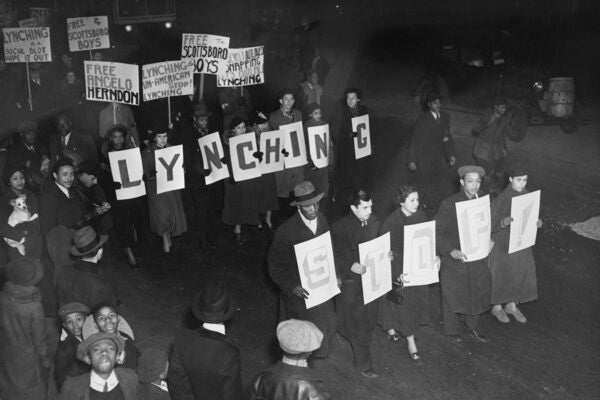The Long Civil Rights Movement
The “master narrative” of civil rights in the United States obscures the history of a more radical civil rights movement that stretches to the 1930s.
Like, It’s a History of Air Guitar, Dudes!
With roots in the motions and biases of vaudeville, burlesque, mesmerism, and minstrelsy, “air playing” with imaginary instruments long predates rock music.
Policing the Holocaust in Paris
Unlike in the rest of Nazi-occupied Europe, the arrest of Jewish people was largely in the hands of ordinary policemen in France, especially in Paris.
Biking While Black in DC
Because of its political structure, Washington became a test case in federally mandated laws that enabled racially discriminatory policing of public space.
Women Warriors Make Great Propaganda
The presence of female fighters gives legitimacy to armed rebellions and increases the chances of support from international NGOS and other external actors.
Taiping: China’s Nineteenth-Century Civil War
Partially coinciding with the American Civil War, the Taiping “Rebellion” in China was one of the most destructive conflicts in history.
Defining and Redefining Intersex
The transatlantic circulation of ideas between Baltimore and Zurich consolidated and standardized treatments of intersex infants in the 1950s.
Painting Race
The construction and expression of race by skin color literally became visible in Western art in the eighteenth century.
Printing Anarchy
The stock figure of the “anarchist” is a bomb-thrower or assassin, but political scientist Kathy E. Ferguson argues it should be a printer.
Imperial Humo(u)r
Imperialism, experienced as both royal subject and new colonizer, has been a key element in the development, continuity, and disruption of American humor.
Archaeology of the October Cuban Crisis
A contemporary archeology project studying the remains of the Cuban Missile Crisis of October 1962 reveals the human face—literally—of the conflict.
All The Way With LBJ?
In March 1968, US President Lyndon B. Johnson announced he would neither seek nor accept the nomination of the Democratic Party. That wasn’t the whole truth.
Staying Cool: Helpful Hints From History
Take a look back at how others have survived—and thought about—the high heat of summer.
The History of Peer Review Is More Interesting Than You Think
The term “peer review” was coined in the 1970s, but the referee principle is usually assumed to be as old as the scientific enterprise itself. (It isn’t.)
Battery X: A Secret Test of Women at War during WWII
Although their contributions have been largely forgotten, women played an active role in Washington DC’s air defense system during World War II.
History’s Footnotes
The addition of footnotes to texts by historians began long before their supposed inventor, Leopold von Ranke, started using them (poorly, as it turns out).
Real Estate and the Revolution
When George III issued a proclamation forbidding settlement west of a line running through the Appalachian Mountains, colonists decided they’d had enough.
Matilda Tone, Historian of Irish Republicanism
Through the work and writing of Matilda Tone, her late husband, Theobold Wolfe Tone, was constructed as the hero of Irish republicanism.
Modern Piracy: Arbitration as Plunder
In a world of globalized trade, an industry of piratical lawyers has arisen to help transnational corporations seize the assets of supposedly sovereign states.
Power over Presidential Records
By law, all communications seen and/or touched by a United States president are supposed to be preserved. Reality—and executive privilege—is a lot messier.
Islands in the Cash Stream
Tiny island states, usually former British colonies, have been re-colonized by global finance and now depend on “archipelago capitalism” for survival.
Biobanking the Victims of Nuclear War
Nearly 2 million biological samples from people affected by radiation from World War II nuclear bombings are stored in facilities in Hiroshima and Nagasaki.
Trans-lating the Story of Fanny and Stella
The Victorian-era trial of Fanny and Stella has been variously interpreted over the years. But what if it was a trans narrative all along?
Aurorae and the Green of the Night Sky
On the historical hunt for the origin of the enigmatic green line in the spectrum of the aurora borealis.

























